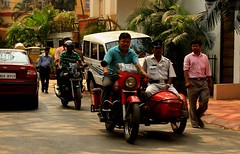
Sarat Chandra Chattopadhyay is one of my grandmother’s favorite novelists, and she says so with an air of superiority. To like Sarat Chandra is to be acknowledged as a true connoisseur of literature in India.
So it is at the risk of being rebuffed that I say this: Sarat Chandra’s novels, particularly at the storyline level really get up my nose. I have tried reading them through all kinds of lenses—rose tinted, myopic, historic etc. etc. but they seem to always end up in the same place.
The female protagonist is always bovine and sweet-tempered. She has all but trashed her sense of self and individuality, and happily submits to the whims of her male counterpart, her family, and society, serving them all diligently, and allowing them to do with her life whatever they please. The male protagonist is almost a mirror opposite – self-seeking, irresponsible, thick-skinned and narcissistic. He believes that the world – including his family and the female protagonist are there to serve him and submit to his will. This in a nutshell is Sarat Chandra’s idea of an ideal male-female relationship.
Parineeta, continues to be one of Sarat Chandra’s most popular works among Indians as indicated by the huge popularity of its recent movie adaptation. It is the story of a 13-year-old orphan girl, Lalita, who is raised in her uncle’s house and is infatuated with the neighbor’s son, Shekhar. In her relationship with Shekhar she willingly renders herself choice-less. All her decisions and activities are dictated to by his wants and moods. If her going out for a movie with her friends displeases him, then she sulks and sobs but eventually obeys his whim. On one occasion, she garlands Shekhar on a certain day deemed auspicious, when by virtue of that prank she is considered betrothed to him. There upon she begins to regard Shekhar as her husband. Shekhar who seems bored and aloof, however knows that his father would never accept his marriage to an orphan girl with no dowry to her name. Yet, he is smug in the knowledge of the hold he has on her.
Sighing deeply, Shekhar said aloud in a stifled voice, ‘What is to be done?’ He knew Lalita only too well, having all but brought her up himself; (more…)
















